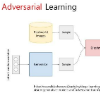One of the leading candidates for near-term quantum advantage is the class of Variational Quantum Algorithms, but these algorithms suffer from classical difficulty in optimizing the variational parameters as the number of parameters increases. Therefore, it is important to understand the expressibility and power of various ans\"atze to produce target states and distributions. To this end, we apply notions of emulation to Variational Quantum Annealing and the Quantum Approximate Optimization Algorithm (QAOA) to show that QAOA is outperformed by variational annealing schedules with equivalent numbers of parameters. Our Variational Quantum Annealing schedule is based on a novel polynomial parameterization that can be optimized in a similar gradient-free way as QAOA, using the same physical ingredients. In order to compare the performance of ans\"atze types, we have developed statistical notions of Monte-Carlo methods. Monte-Carlo methods are computer programs that generate random variables that approximate a target number that is computationally hard to calculate exactly. While the most well-known Monte-Carlo method is Monte-Carlo integration (e.g. Diffusion Monte-Carlo or path-integral quantum Monte-Carlo), QAOA is itself a Monte-Carlo method that finds good solutions to NP-complete problems such as Max-cut. We apply these statistical Monte-Carlo notions to further elucidate the theoretical framework around these quantum algorithms.
翻译:近期量子优势的主要候选者之一,是量子优势的变异性量子 Algorithms(QAOA)等级,但是这些算法在随着参数数量的增加而优化变异性参数参数方面存在典型的困难。 因此, 理解各种 ans\ atze 的可表现性和力量非常重要, 以生成目标状态和分布。 为此, 我们将模拟概念应用到变异性量量量量子Annaaling 和 Quantum Aportimal 优化性Algorithm(QAOA) 的等级, 以显示QAOA在优化变异性离子值参数表时, 在优化变异性值参数时, 这些变异性 QA QA 的变异性量子 Annaalaling 时间表基于一种新颖的多度参数化, 可以与 QAOOA 相近似, 。 为了比较“ 量子” 类同型的解算法, 我们开发了蒙特- Carlo 方法的统计概念。 Monte- Carlo 方法是产生随机性变数的计算机程序, 而 Conte- Cal- dal- dal- dal- dal- dal- dol- dal- drol 这样的计算方法。



